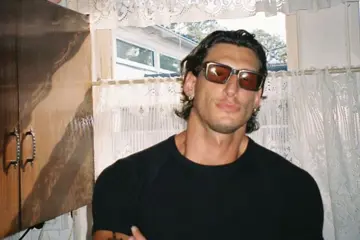“My father does have some fairly crazy fans,” laughs Brandon Cronenberg, the son of legendary director David Cronenberg. “And I experienced some of that weird celebrity-by-proxy thing. On my first day at this new high-school, some kid came up to me and said: 'I heard you were coming. We have a lot to discuss.' I think, mostly, he really wanted to know if my dad would have lunch with him.”
Cronenberg's debut film, Antiviral, is an exploration of the obsession of the TMZ realm —“that extreme fanaticism is completely insane, it suggests a total loss of perspective”— couched through something familiar to fans of his father: body-horror. In 2004, Cronenberg, who'd just begun film-school, came down with a brutal flu, which lead to “semi-conscious reveries” where he “was obsessing about the fact that [he] had something in [his] body that, physically, came from another body, and it felt weirdly intimate.”
“It occurred to me that a celebrity-obsessed fan of, say, Angelina Jolie, could conceivably want germs from her as a way of connecting physically to this person they're obsessed with,” offers Cronenberg. So, slowly, that became the central idea driving his debut feature; which explores intersections of celebrity and physicality in a dystopian near-future barely removed from our current digital reality.
“We don't really like to think of ourselves, now, as bodies,” Cronenberg says. “People are more invested in these idealised, digitised versions of themselves than they are in their actual corpus. And it relates to celebrity culture, too: in these profiles, people play both the paparazzi and the celebrity; so much of Twitter is taking candid photos of you coming out of restaurants, or telling people what you're eating, just documenting this endless banality all day. It's like you're living your own celebrity experience.”
Don't miss a beat with our FREE daily newsletter
Antiviral, with its contrasts between “antiseptic, bright-white interiors [and] macroscopic close-ups of the body,” is a film about mortal decay and digital immortality. “The physical body of the human-being who is the celebrity is almost unrelated to the cultural construct of the celebrity that exists in the media and the public consciousness,” posits Cronenberg. “Even when that body dies, the celebrity construct lives on in commercials 40 years later. Think about the Tupac hologram, and all that it stands for. Tupac's music career is still ongoing, almost 20 years after he died.”
It's a thoughtful, deeply-philosophical piece of filmmaking that marks a plenty impressive debut. Still, just as he's experienced all his life —“people approach you with a lot of preconceptions; both undeserved respect and undeserved contempt”— Cronenberg will be forever compared to his father. “On the one hand, no doubt it's attracted more attention to my film. On the other, it's the only frame through which it's viewed; and so much of the discussion is how my film relates to my father's career, and not it as its own thing,” he says.
“People say: 'he's making horror films just like his horror-film father'. But he hasn't made a horror film in over 20 years! He's been making anything but: period-pieces, crime dramas. To avoid everything he's touched on in his very long career would be very difficult.” The younger Cronenberg could've made a romantic-comedy, perhaps? “Well, I think Antiviral is a romantic-comedy. But no one else agrees with me.”
WHAT: Antiviral
WHEN & WHERE: In cinemas Thursday 25 April Exclusive to Cinema Nova















